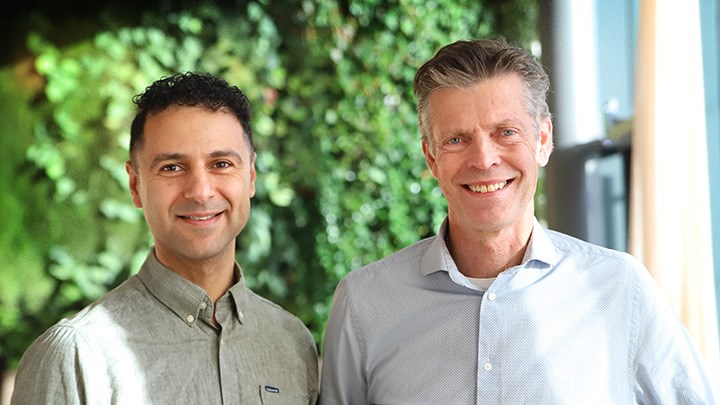Discovery could help slow the next pandemic

Hazem Khalaf and Torbjörn Bengtsson founded Virenc, a company developing antiviral drugs. “Some viruses have vaccines, which provide prevention but they can’t help those already sick. Almost 90 per cent of all viruses have no vaccine,” says Torbjörn Bengtsson.
Imagine a cure available as a nasal spray that reduces the spread of viruses like corona and influenza. A pharmaceutical treatment could go to market in a few years, says Hazem Khalaf and Torbjörn Bengtsson, researchers and innovators behind the company, Virenc AB. “We believe this product has enormous potential.”
Ten years ago, Hazem Khalaf, docent in cellular microbiology at Örebro University, discovered a peptide in lactic acid bacteria with unique properties: it could attack disease-causing bacteria.
Together with Torbjörn Bengtsson, professor emeritus in biomedicine, Hazem Khalaf began investigating which bacteria the peptide acted on and how the mechanism is triggered. Upon discovering the peptide ruptured the bacteria’s lipid membrane – or fatty envelope – their finding led to an exciting notion. Not only do bacteria have lipid membranes, but many viruses as well, including influenza, coronaviruses, and mosquito or tick-borne viruses.
Effective treatment against viruses
“The peptide’s mechanism is so unique that it should work against viruses as it does against bacteria. That’s why we tested it on different types of viruses. We cooperated with a virologist in Linköping during the pandemic to test it on corona and influenza viruses,” explains Hazem Khalaf.
The tests proved to be a great success, showing that the peptide was even more effective against viruses than bacteria, killing the virus and reducing its spread.
Hazem Khalaf and Torbjörn Bengtsson quickly realised the potential of their discovery.
“Some viruses have vaccines, which provide prevention, but they can’t help those already sick. But for roughly 90 per cent of all viruses, no treatment is available. An antiviral drug based on our peptide could target all viruses with lipid membranes. A treatment similar to how broad-spectrum antibiotics work against severe bacterial infections,” says Torbjörn Bengtsson.
An antiviral drug against mutated viruses
While the peptide can work on all viruses with lipid membranes, the researchers initially focused on respiratory viruses as these infections can easily be treated with a nasal spray or inhaler.
“We’re not aiming to compete with vaccines, but develop a complement treatment option. Many vaccines have the downside that targeted viruses can develop resistance. Viruses can’t do that to our antiviral drug,” explains Hazem Khalaf, adding, “Vaccines must constantly be updated as the virus mutates. This isn’t necessary with our antiviral drug, as viruses cannot alter its lipid membrane.”
“After the pandemic outbreak, it took a year before we had a vaccine. Countless people became ill, and many died from the virus during vaccine development. If we’d had an antiviral drug available, we could’ve intervened much earlier and treated the disease – and limit its spread,” says Torbjörn Bengtsson.
“Starting a life science company is challenging”
Hazem Khalaf and Torbjörn Bengtsson contacted Örebro University Holding AB, which supported them with funding for a Swedish patent application. When Virenc AB was founded, the holding company went in as co-owner. Since then, Virenc has received innovation funding from Region Örebro County, collaborated with Karlstad-based Aurena Laboratories to produce medical devices, and applied for international patents.
“Starting a life science company is challenging. Developing a drug or medical device is very expensive and requires rigorous testing. The holding company has been a great help with knowledge, connections, and funding,” says Hazem Khalaf.
“We believe this product – a drug targeting most viruses – has enormous potential. It could alleviate human suffering, benefit society, and become a crucial instrument when the next viral pandemic hits. We’re now focused on securing patents for the underlying technology,” explains Torbjörn Bengtsson.
Antiviral drugs – an essential tool for the next pandemic
Further testing and verification of results await to ensure the treatment works, is effective, and is safe to use with no side effects. Before the product can reach the market, Virenc needs to secure additional funding. If everything goes according to plan, the product could be released within a few years.
“I hope our products will soon be used and make a difference, especially in the developing world where access to vaccines and drugs is limited. If we can reach these areas with a product that reduces the spread and cures viral diseases, we’ll have achieved something significant,” says Hazem Khalaf.
“We live in a world with a growing population. The spread of both old and new viruses will become an increasing challenge. It’s only a matter of time before the next pandemic arrives. When it does, having tools like this in place will be critical,” concludes Torbjörn Bengtsson.
Text: Jesper Eriksson
Photo: Jesper Eriksson
Translation: Jerry Gray
